#sahhaf
Text
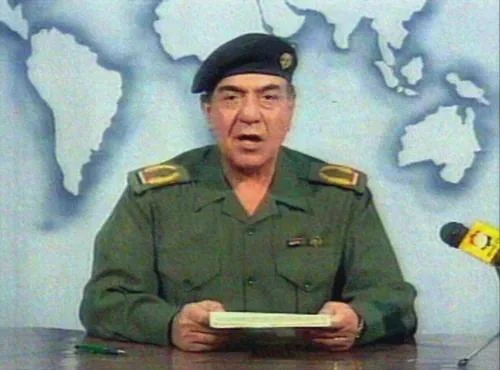
El ministro de Información iraquí, Muhammad Saeed al-Sahhaf, más conocido en Occidente como "Bagdad Bob" durante una transmisión de propaganda en tiempos de guerra en 2003. Sahhaf era conocido por sus coloridas y ampliamente burladas conferencias de prensa en las que a menudo hacía afirmaciones ridículas sobre los éxitos militares de Irak.
1 note
·
View note
Text
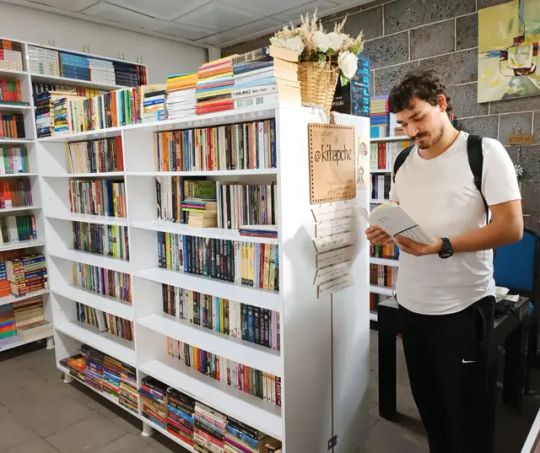
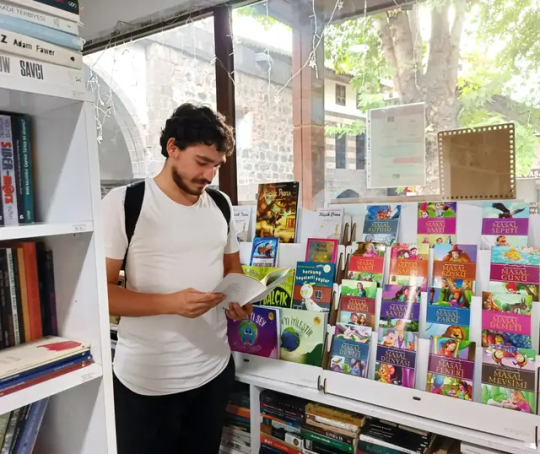
Diyarbakır'da birbirinden güzel kitapları çok uygun fiyatlarla okurlarına sunan, aynı zamanda öğrencilerin kırtasiye ihtiyaçlarını karşılamak için "Askıda Ekmek Karnı, Askıda Kitap Ruhu Doyurur' projesini başlatan @kitapche ailesine ve @silan_eps Hocam'a çok teşekkür ediyorum. İskender Paşa Konağı'na yakışır bir sahaf olmuş. Her şey gönlünüzce olsun İnşALLAH...
.
.
.
#newproject #Diyarbakır #diyarbekir #kısafilm #film #uzunmetraj #kısametraj #uzunmetrajfilm #amed #kamerasecond #like #kameraindonesia #kameracanon #kameranikon #fotograf #cameramurah #photooftheday #camerastore #kameramalang #kamera #camera #photography #nikon #foto #sahaf #sahaff1m #sahaff #sahhaf #sahaflar #sahafi
1 note
·
View note
Text
Al-Sahhaf _The Austrian Foreign Minister will visit Baghdad tomorrow, Monday
http://dlvr.it/SvwzBk
0 notes
Text
Ministrul de externe ucrainean și-a anulat vizita la București din „motive de securitate”, dar se duce la Bagdad. Aurescu, tot slugă…
Ministrul de externe ucrainean și-a anulat vizita la București din „motive de securitate”, dar se duce la Bagdad. Aurescu, tot slugă…
Ministrul ucrainean de externe Dmitry Kuleba va efectua luni o vizită oficială la Bagdad, a anunţat duminică portalul Shafaq News, citându-l pe purtătorul de cuvânt al Ministerului de Externe irakian Ahmed Al-Sahhaf.
Bogdan Aurescu rămâne în continuare o slugă…

View On WordPress
0 notes
Text
Iraq Expecting Russian Foreign Minister With Visit - Reports
BAGHDAD (UrduPoint News / Sputnik – 05th February, 2023) Iraq is expecting a Russian delegation, led by Foreign Minister Sergey Lavrov, with a visit on Sunday evening, Iraqi news Agency (INA) reported, citing Iraqi Foreign Ministry spokesman Ahmed Al-Sahhaf.
“Russian Foreign Minister Sergey Lavrov will visit Baghdad this evening,” Al-Sahhaf told INA.
The Iraqi Foreign Ministry spokesman confirmed…

View On WordPress
0 notes
Photo
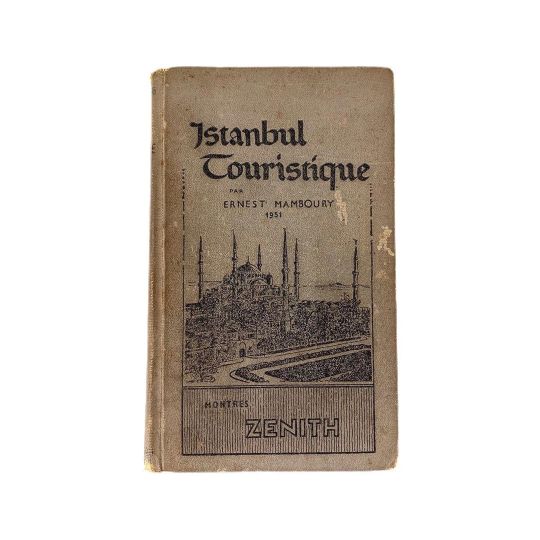
İstanbul Touristique - Ernest Mamboury Çituri Biraderler Basımevi, 1951 | 180TL | #orabooks #okumak #kitap #book #books #turkey #istanbul #kadıköy #moda #sahhaf #klasik #classic #koleksiyon #şiir #yazar #edebiyat #şair #kütüphane #roman #sahaf #söz #okumak #kitaplık #orabook #bookstore #nadirkitap #literature #poem https://www.instagram.com/p/B_cYDiJgpFn/?igshid=1t2hev1zruhi8
#orabooks#okumak#kitap#book#books#turkey#istanbul#kadıköy#moda#sahhaf#klasik#classic#koleksiyon#şiir#yazar#edebiyat#şair#kütüphane#roman#sahaf#söz#kitaplık#orabook#bookstore#nadirkitap#literature#poem
2 notes
·
View notes
Photo
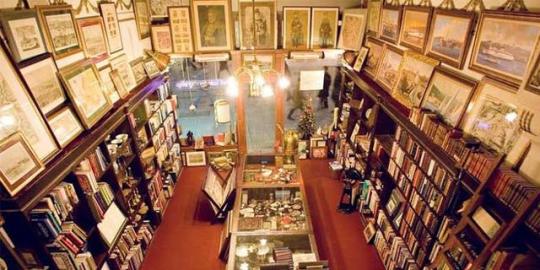
“Bâri cem’i kütüb etdin çalış istihrâca Kalma bî-beng ü nevâ dehrde sahhâf gibi...” (Kitap topladın, kitaplık sahibi oldun; hiç değilse, onlardan bir şeyler çıkarmaya çalış; sahhâf gibi meyvesiz ağaca benzeyip durma...)
20 notes
·
View notes
Photo
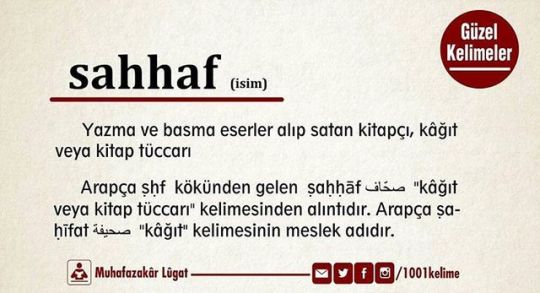
Günün Kelimesi #sahhaf ; yazma ve basma eserler alıp satan kitapçı … #güzelkelimeler #gününkelimesi #1001kelime
5 notes
·
View notes
Photo


DONALD TRUMP vs COMICAL ALI (aka Baghdad Bob)
youtube
Was just watching one of Donald Trump's speeches from today and I inexplicable thought about Comical Ali (Baghdad Bob). Absolutely no idea why. Thought I'd make a quick video about these two different and completely "unrelated" people/topics ;) Note: I'm by no means saying that Trump can't win...that's the scary bit. Just wikipedia descriptions. Mohammed Saeed al-Sahhaf is a former Iraqi diplomat and politician. He came to wide prominence around the world during the 2003 invasion of Iraq, during which he was the Iraqi Information Minister under Iraqi president Saddam Hussein, acting as the spokesperson for the Arab Socialist Ba'ath Party and Saddam's regime. He is best known for his grandiose and grossly unrealistic propaganda broadcasts before and during the war, extolling the invincibility of the Iraqi Army and the permanence of Saddam's rule. His announcements were met with widespread derision and amusement by Western nationals. In the US he was popularly known as Baghdad Bob, in the UK as Comical Ali (a joke derived from Saddam's cousin Ali Hassan al-Majid, who was also known as "Chemical Ali"), and in Italy as Alì il Comico. Al-Sahhaf is known for his daily press briefings in Baghdad during the 2003 Iraq War. His colorful appearances caused him to be nicknamed "Baghdad Bob"[4] (in the style of previous propagandists with geographical aliases—some of them alliterative, such as "Hanoi Hannah" and "Seoul City Sue") by commentators in the United States. He was nicknamed "Comical Ali" (a wordplay allusion to Chemical Ali, the nickname of former Iraqi Defence Minister Ali Hassan al-Majid) by commentators in the United Kingdom. The Iraq War[nb 1] was a protracted armed conflict that began with the 2003 invasion of Iraq by a United States-led coalition. The invasion regime toppled the government of Saddam Hussein. However, the conflict continued for much of the next decade as an insurgency emerged to oppose the occupying forces and the post-invasion Iraqi government.[50] An estimated 151,000 to 600,000 or more Iraqis were killed in the first 3–4 years of conflict. The United States officially withdrew from the country in 2011 but became re-involved in 2014 at the head of a new coalition; the insurgency and many dimensions of the civil armed conflict continue. The invasion began on 20 March 2003, with the U.S., joined by the United Kingdom and several coalition allies, launching a "shock and awe" bombing campaign. Iraqi forces were quickly overwhelmed as U.S. forces swept through the country. The invasion led to the collapse of the Ba'athist government; Donald John Trump is an American businessman, television producer, author, politician, and the Republican Party nominee for President of the United States in the 2016 election. Donald Trump and Hillary Clinton square off in the third and final debate before the presidential election. For Trump, Wednesday night’s debate may be the last opportunity to salvage the dwindling support that in recent weeks has seemingly placed the election increasingly out of the Republican nominee’s reach. The encounter at the University of Nevada, Las Vegas, comes as both campaigns are beset by controversy in the final stretch of the most unusual presidential campaign in modern history.
3 notes
·
View notes
Text
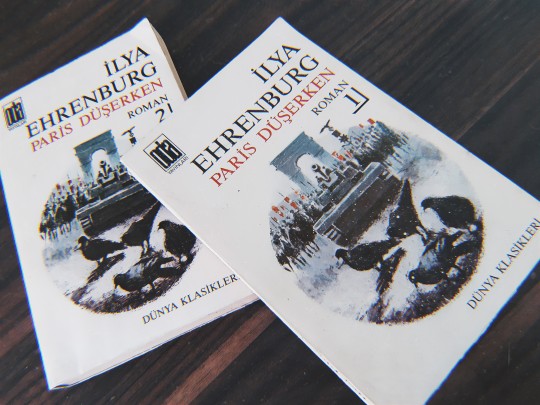
Çokta sevmediğim bir yazarın çok haklı bulduğum bir yazısını okumuştum kitap almakla alâkalı. Kendisi "alacağı kitabı rüyasında gördüğünü" yazmıştı. Bir kitabı almadan önce onunla hemhal olma, hissetme, kalbini ona hazırlama.. Siz mi onu çekersiniz o mu sizi çeker bilmiyorum ama yazıyı okurken haklı bulmuştum. Aynı şey daha önce birkaç kez daha başıma gelmişti sonuncusu da bu oldu. Tuhaf bir şekilde bu kitap bulunduğu yere beni itti adeta. Orjinal 1987 basımı Ikinci Dünya Savaşı konulu bir kitap buldum. Yetmedi birde Sahhaf amcamdan iki güzel öneri daha aldım daha ne diyebilirim, okumak gerçekten mucize şey.
2 notes
·
View notes
Link
SAHHAF RAİF YELKENCİ - AHMED GÜNER SAYAR
3 notes
·
View notes
Text
Kant, Categorical Imperatives
Hello guys, I’m back with a new post!
Today I will be explaining Kant’s ethical theory on Categorical Imperatives and comparing it to the 2004 documentary titled “Control Room.”
So first of all, who is Kant?

Kant is a philosopher who believe that morality and religion should be kept apart.

He believed that morality came from our individual selves instead of a higher power. It also didn’t matter if one was religious or not, according to Kant, humans were meant to be moral. (Moreover he argued not to rely on religion specifically because he believed we had the intellect to figure out morality on our own)
He titled his ethical theory as “Categorical Imperatives” and means that they were commands people must follow regardless one’s desires. For example, although teenagers may not like school, they are obligated to go to school until they can legally drop out.
His theory had two popular formulas and they can be summarized as:
1) Act and follow the rules in all similar situations.
2) Treat humans equal and do not manipulate others.
An example of the first formula is to always be truthful at all times even if you or someone else were in danger. If someone threatened to kill your family if you didn’t get him money, you would be responsible for their deaths if you lied about not having money at all, according to Kant’s rules on this formula.
An example of the second formula is to treat people equally. If you treated someone poorly just to gain the popularity or attention from a widespread audience, this is a violation of Kant’s ethics to his second formula.
Okay now that I have explained everything, let’s compare this theory to the “Control Room”

The documentary film is about the news network Al Jazeera and its relations to the US Central Command, news organizations, and the invasion of Iraq.
Throughout the film, the history of Al Jazeera was pretty unclear. On one hand, Muhammad al-Sahhaf argued that the network was transmitting american propaganda focusing on American tanks and Iraqi Casualties. Fox News also chose to leave out some material as well and didn’t effectively explain both sides of the invasion.
Even based on this takeaway of the film so far, the film was already violated Kant’s ethics. I believe this would resonate with formula 2. According to Kant, humans shouldn’t manipulated. According to Al Jazeera’s producer Samir Khader, it was perceived that because they believed their culture was so far behind from others. However, they didn’t hide some things from the media to execute because it makes the audience assume a negative connotation of the network. It would have better for both news outlets to tell the truth and leave it up for humanity to decide, that would have followed Kant’s ethical theory.
Touching up on these points, this film showed lots of bias which also violates the first formula. They didn’t show the destruction of iraqi military resources. As journalists, they are meant to always be truthful and inform the audience about what’s happening in the world. However, this was not executed throughout the documentary and just focused on painting America in a positive light despite this be war front.
All in all, this film in my opinion didn’t follow the Categorical Imperatives at all. According to Kant, it’s important to be truthful no matter what negative consequences are. As journalists and news network, they had an opportunity to do so in the films but they didn’t jump on that chance.
1 note
·
View note
Photo

V I V E Z L’A D R E N A L I N E
SAHHAF de nouveau sur scène
Rendez-vous ce 02 Novembre 2019 à 14h00
Au CCESCA Antanimena
1 note
·
View note
Photo
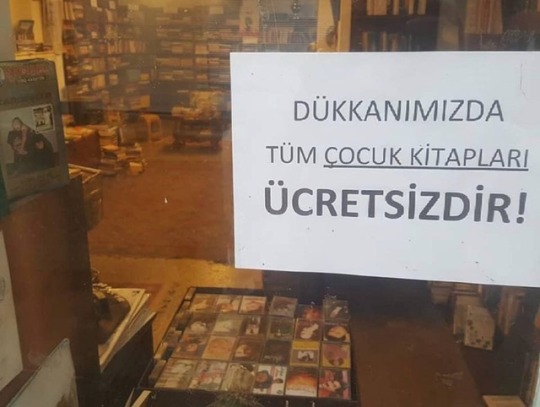
Eskişehir’deki Fahrenheit451 Sahhaf. Çocuk kitaplarını ücretsiz veriyor, mesajı ise: Canlı olarak var olduğumuz müddetçe insan olarak da var olmaya gayret edeceğiz. Kapılarımız açık olduğu müddetçe çocuk kitaplarını ücretsiz vereceğiz. Çünkü; “Ne gelir elimizden insan olmaktan başka?”
16 notes
·
View notes
Text
On Remembering the Love of a Library
by Lâle Can, 2021–2022 ANAMED Senior Fellow
December 2021
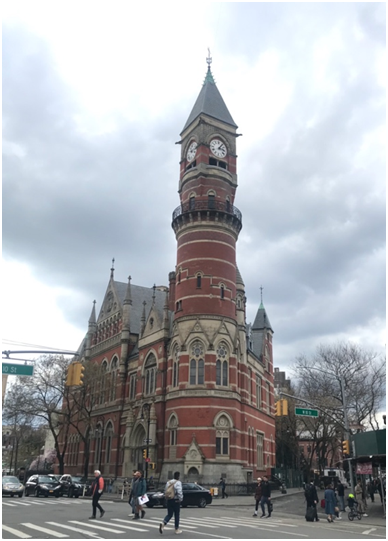
New York Public Library, Jefferson Market Branch. Greenwich Village, New York Photo taken by author (2022)
It is finally Friday and it has been a long week. There is a new COVID variant, again. The Turkish lira has depreciated, again. Archival documents on sürgün (exile) have led me down the path of readings on forced labor and incarceration that are part of an interconnected system of crime and punishment that I am trying to understand and reconstruct.
It is not the most uplifting of topics. After many trips to the Ottoman Archives, I have acquired thousands of documents that I wish I could read with a coterie of elves trained in Ottoman paleography. Unable to summon them to my aid, I sit down with a coffee and start reading a book on crime in the long nineteenth century. I realize that instead of my Redhouse Ottoman lexicon, I need a modern Turkish dictionary to make sense of English terms translated into academic Turkish. I write down these new words and wince as my pen hits the paper and produces ligatures for terms like “yöntembilim” (methodology) and “zamanbilimsel” (chronological). I wonder what my mother would think of these words and laugh at the prospect of trying to explain them to her—an Istanbulite whose Turkish was suspended in the late 1960s when she emigrated to America—and imagine a scene that would not be out of place in an Ahmet Hamdi Tanpınar novel or Refik Halit Karay story.
On the ANAMED terrace, my thoughts drift in line with the clouds, which are now overtaking the sun and seem intent on sending me indoors. Instead of my room or the fellows’ study space—both of which come with musical accompaniment from Istiklal Caddesi and her many side streets—I head to the American Research Institute in Turkey (ARIT) collection within the ANAMED Library. I say a silent hello to the books and wonder how they’re doing—a habit from childhood, when I thought that all books had feelings. Back then, I frequently visited the Jefferson Market Branch of the New York Public Library, which was in a whimsical West Village building that reminded me of a castle. Thinking of how far I am from the places of these memories, I wish it were possible to trace the path of the volumes all around me as they traveled from warehouses, personal collections, and sahhafs to the former ARIT library in Arnavutköy, and then to ANAMED’s home in Merkez Han. I remember when it was possible to see who had borrowed a book before you, and to read their name—often written in cursive, on a card pasted into the back pages or cover of the volume. I suddenly realize how long it has been since I have been able to work in a library, and how much I have missed it. The stacks—which magically extend by way of inter-library loan and the matchless work of librarians—offer something that has been in short supply since 2020: hope and possibility.
Indeed, I had not been able to go to a library for over two years. When the pandemic hit New York, I lost privileges at my alma mater, and the library of my public university only reopened as I was preparing to leave for Istanbul for the fall 2021 semester. Despite the ease of downloading books online or the chance to buy new titles and add them to a growing collection in my small Brooklyn apartment, I had not realized how much I missed the joys of being in a space dedicated to their perusal, and of searching stacks for a single call number and browsing the titles of neighboring tomes. With so much of my life shifting to a virtual world, I had missed the feeling of picking up heavy bound journals and thumbing through years of articles, and learning answers to questions I had not realized I had.
In a notebook illustrated with songbirds, including a hoopoe—a bird that became my favorite after reading Fariduddin Attar’s majestic The Conference of the Birds in an undergraduate literature course with Talat Halman—I make lists and write down pages and pages of notes. Books to check out, articles to look up, lines of inquiry to pursue. I create a path forward with research, thinking about the memoirs, legal codes, and studies that will help me to write a new history of exile. I thumb through articles and think about the many losses that exiles endured, including separation from their books. Questions lead to questions: How had exile evolved in the nineteenth century? Who ultimately determined where one would be sent? Why did some people end up in fortresses on the Black Sea and others in the Mediterranean? How had persons been cast out as problems, then later been pardoned or reclaimed as loyal subjects? How had a culture of exile reproduced itself, so that people once banished would mete out this punishment on their own opponents? What had happened to those whom exiles were forced to leave behind?
I find myself building a little fortress of books on the desk, all the while wondering what it was like to be in Sinop or Rhodes or any number of places that I am continuing to learn about. I realize that the library has become a refuge from the pandemic and a place of inspiration. I write a note to myself to share this experience with my students when I return to teaching, and to try to explain how learning can be an act of hope in difficult times. I write a second note: to tell my students to visit a library. I hope that in New York, I can get them to fall in love with a library, perhaps for the first time.
0 notes
Photo
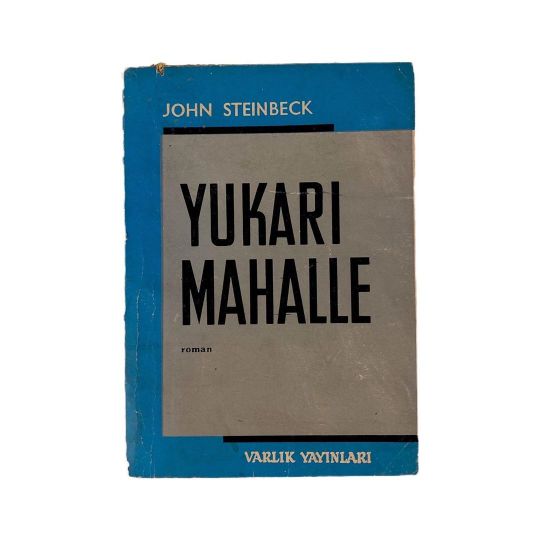
Yukarı Mahalle - John Steinbeck Varlık Yayınları | 7TL | #orabooks #okumak #kitap #book #books #turkey #istanbul #kadıköy #moda #sahhaf #klasik #classic #koleksiyon #şiir #yazar #edebiyat #şair #kütüphane #roman #sahaf #söz #okumak #kitaplık #orabook #bookstore #nadirkitap #literature #poem https://www.instagram.com/p/B_scgLwAzQH/?igshid=8bpfr7hb8s45
#orabooks#okumak#kitap#book#books#turkey#istanbul#kadıköy#moda#sahhaf#klasik#classic#koleksiyon#şiir#yazar#edebiyat#şair#kütüphane#roman#sahaf#söz#kitaplık#orabook#bookstore#nadirkitap#literature#poem
1 note
·
View note